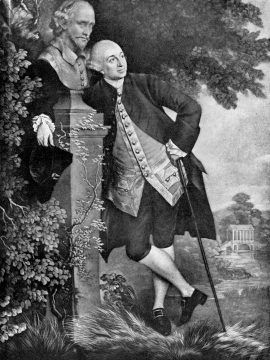Dominic Dromgoole in The New York Times:
 Shakespeare’s power to endure has been ensured by twin track modes of survival: his life on the page and on the stage. His texts are pored over scrupulously by academics, read dreamily by kids and scanned with soft remembrance by the sere. At any given moment, his dramatic verse is sung, shouted, muttered and sometimes spoken with the warm assurance it needs, from hundreds of stages to thousands of eager spectators.
Shakespeare’s power to endure has been ensured by twin track modes of survival: his life on the page and on the stage. His texts are pored over scrupulously by academics, read dreamily by kids and scanned with soft remembrance by the sere. At any given moment, his dramatic verse is sung, shouted, muttered and sometimes spoken with the warm assurance it needs, from hundreds of stages to thousands of eager spectators.
Two new books — “Shakespeare’s Library,” by Stuart Kells, and “What Blest Genius?,” by Andrew McConnell Stott — offer insights from each strand. Stott’s book delivers a vivacious portrait of the Stratford-upon-Avon Jubilee of 1769, organized by the actor and manager David Garrick, whose goal was to make a lot of noise for himself and in the process marmorealize Shakespeare. Kells goes on a quest through the oddly perverse world of booksellers and bibliographers, in search of Shakespeare’s own tomes. Coming from a performance rather than an academic background, I have a greater propensity for the Garrick story, but whatever your background, it’s easy to distinguish between a book to be cherished and one to be thrown across the room.
More here.
